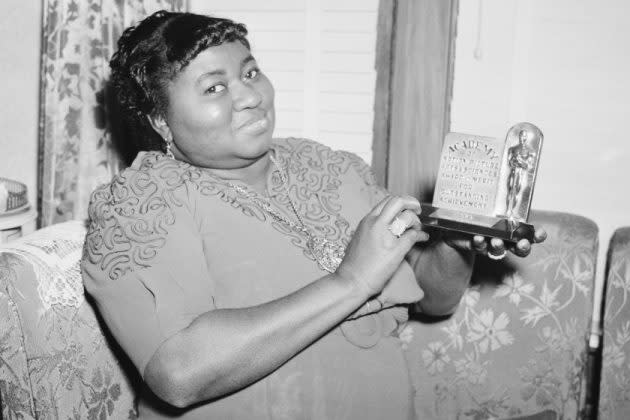‘Hattie’s Come Home’: Pioneering ‘Gone With the Wind’ Winner Saluted with Replacement Oscar Presentation at Howard University

WASHINGTON, D.C. — It was the first Oscar ever awarded to a Black actor: The plaque presented to actress Hattie McDaniel in 1940 for her iconic supporting role in the landmark 1939 film “Gone With the Wind.”
Following McDaniel’s death in 1952, the award was bequeathed to D.C.’s Howard University, where it was a prized possession — until it mysteriously disappeared a decade later.
More from Variety
But at last, the Academy of Motion Picture Arts and Sciences presented a replacement plaque on Oct. 1 to Howard University’s Chadwick A. Boseman College of Fine Arts. The ceremony billed as “Hattie’s Come Home” was a moving tribute to the artist’s life and legacy. Participants included Jacqueline Stewart, president of the Academy Museum of Motion Pictures, and Teni Melidonian, executive VP of Oscars strategy at AMPAS.
Actor Phylicia Rashad, outgoing dean of the Boseman College of Fine Arts, opened the evening with a personal reflection of her own experience as a Howard undergrad and aspiring artist. She said she was personally inspired by viewing the award in its case, and is now overjoyed that it is finally back for new generations.
The program included clips of McDaniel’s performances in “Gone With the Wind” and several other films, along with her acceptance speech at the 1940 Academy Awards ceremony, where she and a guest were forced to sit at a segregated table. Also emphasized were the daily struggles of the multitalented entertainer who appeared in more than 300 films (many of her roles were uncredited). She is believed to have been the first Black woman to sing on radio.

Participants in a panel discussion included filmmaker Kevin John Goff, a great-grandnephew of McDaniel who works to restore her legacy. He highlighted her life-long travails and steady perseverance, and concluded with his poem about discrimination called “Black Not Accepted.”
Rhea Combs, director of curatorial affairs at the Smithsonian’s National Portrait Gallery, discussed the Academy Museum’s traveling exhibition which she co-curated, “Regeneration: Black Cinema 1898-1971,” featuring 70 years of Black contributions to film and independent cinema that includes McDaniel as a case study. Combs said the exhibit highlights the breadth of McDaniel’s work as a trained actress and established singer who had paid her dues for decades on the vaudeville circuit and traveling tent shows, in the face of the enormous risks that Black female performers faced in those environments.
“She represented so many individuals, had done grand work and had agency which we felt was important to include. It highlights her travails within an ecosystem of other established actors and thespians,” said Combs.
Panelist Eleanor Traylor, a Graduate Professor of English at Howard and a scholar in African American literature, noted that McDaniel suffered criticism within the Black community for her roles. Traylor noted that McDaniel worked to be a credit to her race and the motion picture industry — in that order.
In presenting the replacement award, AMPAS noted that as a singularly gifted artist, McDaniel made an indelible mark on Academy history and the world of cinema at large. (Back in the early days of the Oscars, supporting actor winners received a plaque rather than a traditional standalone Oscar trophy.)
“Her resilience through the adversity she faced across her life and career, including the impact of racial segregation on the night of her Academy Award win is truly remarkable,” the Academy stated. “Her unforgettable performances continue to capture audiences to this day and her contributions on and off screen have paved the way for those who have followed in her footsteps.”
Best of Variety
Sign up for Variety’s Newsletter. For the latest news, follow us on Facebook, Twitter, and Instagram.

 Yahoo News
Yahoo News 
